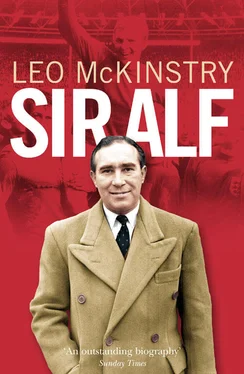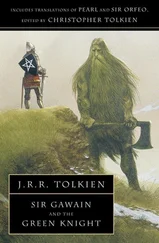I was working hard to get back. I am not being heroic but it was either that or packing the game in. But Alf was playing really well. He was a good reader of the game, a good player of the ball in front of him. A bit slow on the turn but he was made that way. On tackling, he knew when to go in and not to go in. And he made more good passes than most players. He was always cool. There was no personal rivalry between us. I never even dreamed about animosity or anything like that. We were just footballers. Mind you, looking back, Alf was ambitious. He was a hard lad to get to know. He was not stand-offish, but you could never get at him. He was not one of the boys. We travelled everywhere by train in those days, and I was part of a card school, but Alf did not join in. He never got in trouble, because he was not interested.
As Bill Ellerington indicates, Alf’s personality did not change much once he became a successful professional. He remained undemonstrative, reserved, unwilling to mix easily. ‘He would not go out of his way to talk to anybody,’ recalled Ted Bates, ‘but if you wanted his advice, he’d give it. When we played, early on, I roomed with him, and he was always the same, very quiet, getting on with his job.’ Eric Day, the Southampton right-winger, used frequently to catch the train from Southampton to London because his parents lived in Ilford:
I saw him a lot but there was never much conversation. I am not a great talker and Alf certainly wasn’t one. Whenever we chatted, it was only ever about football. He could be a bit short with people, though he was never rude. Alf didn’t suffer fools gladly, I’ll tell you that. He was a bit secretive; he just didn’t chat. Maybe that’s because he was a gypsy. Gypsies are extremely close-knit; they keep it in the family. You never heard him shouting, not on the field or in the dressing-room or on the train. If he had any strong feelings about anyone, he just kept them to himself. He was a very honest bloke. He did not like talking about people behind their backs. You never heard him tear anyone to shreds. He was very modest. There was nothing of the star about him.
The Southampton goalkeeper of the time, Ian Black, highlights similar traits:
Once he had finished training, you seldom saw him. That is fair enough. People are made in different ways. But it did not make him any the less likeable. I think he had quite a shy nature; he was friendly enough but he did not like much involvement with others. Though he would talk plenty about the game, he was not much of a conversationalist otherwise.
Throughout his time at Southampton, Ramsey lived in digs owned by the club, which he shared with Alf Freeman, one of the Saints’ forwards. The two Alfs had served together in the Duke of Cornwall’s Regiment, though Freeman had seen action in France and Germany in 1944-45. Now in his mid-eighties and with his powers of communication in decline, Freeman still retains fond memories of living with Alf:
We had good times together in the army. We were pretty close then. In our Southampton digs, we were looked after well by our landlady. Alf was a lovely man but he was very, very quiet. He was shy and never talked much. Unlike most of us players, he did not smoke or drink much. He always dressed smartly. He liked the cinema, and also did a lot of reading, mainly detective stories.
The late Joe Mallet, who was one of Southampton’s forwards, told Alf’s previous biographer in a powerfully worded statement that Ramsey and Freeman had fallen out:
They were close but they had a disagreement and though they lived together Alf would never speak to Freeman. If you got on the wrong side of Alf, that was it, you were out! You couldn’t talk him around; he would be very adamant. If he didn’t like somebody or something, he didn’t like them. There were no half measures! He was a man you could get so far with, so close to, and then there was a gap, he’d draw the curtain and you had to stop. I don’t think he liked any intrusion into his private life. Alf wouldn’t tolerate anything like that. He’d be abusive rather than put up with it.
But today Freeman has no recollection of any such dispute: ‘There was never any trouble between us. I don’t know where Joe Mallet got that stuff about a disagreement. That just wasn’t true. I always got on well with Alf. He was a good man to me. I liked him very much.’
Pat Millward came to know Ramsey better than most through Alf’s friendship with her husband Doug, who played for both the Saints and Ipswich. Though she recognizes that Alf’s diffidence could come across as offensive, she personally was a great admirer:
People used to think that Alf was difficult because he did not have a lot to say. He would just answer a question and then walk away. A lot of people did not like him. They thought he was too quiet, too pleased with himself. ‘He fancies himself, doesn’t he? Who does he think he is?’ they would say, without really knowing him. But I loved him. He was just the opposite of what some people thought. He was down-to-earth, never bragged, never put on airs, never went for the cheers. And he was such a gentleman, always polite and well-mannered. I remember I was working in the restaurant of a department store in Southampton, and the store had laid on an event for the players, where they were all to receive wallets, and their wives handbags. The gifts were set out on two stands and the players could take their choice. Alf was among the first to arrive. But he held back until all the rest of them had taken what they wanted.
‘Shouldn’t you get your wallet?’ I asked.
‘No, Pat, it’s fine. Let the others get theirs.’
He was a special man. Doug thought the world of him. He was never a joker, but if he liked you, he showed it. On the other hand, if he didn’t like you, he had a way of ignoring you.
Revelling in professional success, Alf was more fixated with soccer than ever. But he still enjoyed some of the other pursuits of his youth, like greyhound racing and cricket. Bill Ellerington recalls:
We would often go to the dog track near the Dell on Wednesday evenings and Alf would come with us. Looking back, he was a very good gambler. There would be six races, six dogs each, and Alf would just go for one dog. Whatever the result, win or lose, he finished. He was not like most of the boys, chasing their money. He was very shrewd. At the time, I just accepted it, but looking back, it showed how clever he was. I always felt there was a bit of the gambler about him, even when he was England manager in the 1966 World Cup. He had this tremendous, quiet self-confidence about him.
Stan Clements also remembers Alf’s enthusiasm for the dogs, but feels that Alf’s lack of social skills has been exaggerated:
Alf was a nice fella once you knew him, easy to get on with. He had worked for the Co-op and was good with figures. His family were involved in racing greyhounds, in fact some of them used to live on that, so he knew about gambling. At that time in the late 1940s, dog-racing was extremely popular; it was a cheap form of entertainment for the working-class. Alf would usually go to the dogs on a Wednesday with Alf Freeman. He was also good on the horses. He was very quick at working out the odds. He was not tight with his money, or anything like that. He was quite prepared to open his wallet. He was a cool gambler; you never saw him get excited. He would put his bets on in a controlled manner. He would assess the situation. He could lose without it affecting him. In everything he did, he was never over-the-top. He always had control of himself. He enjoyed a drink, but he was not a six pints man.
Speedway racing was another interest of Alf’s and he would regularly visit the local track at Bannister Court near the Dell. He became good friends with the local racer Alf Kaines, and he persuaded Southampton FC to allow Kaines to join the players sometimes for physical training during the week. Stan Clements also remembers that Alf displayed an innate sense of co-ordination in every sport:
Читать дальше












